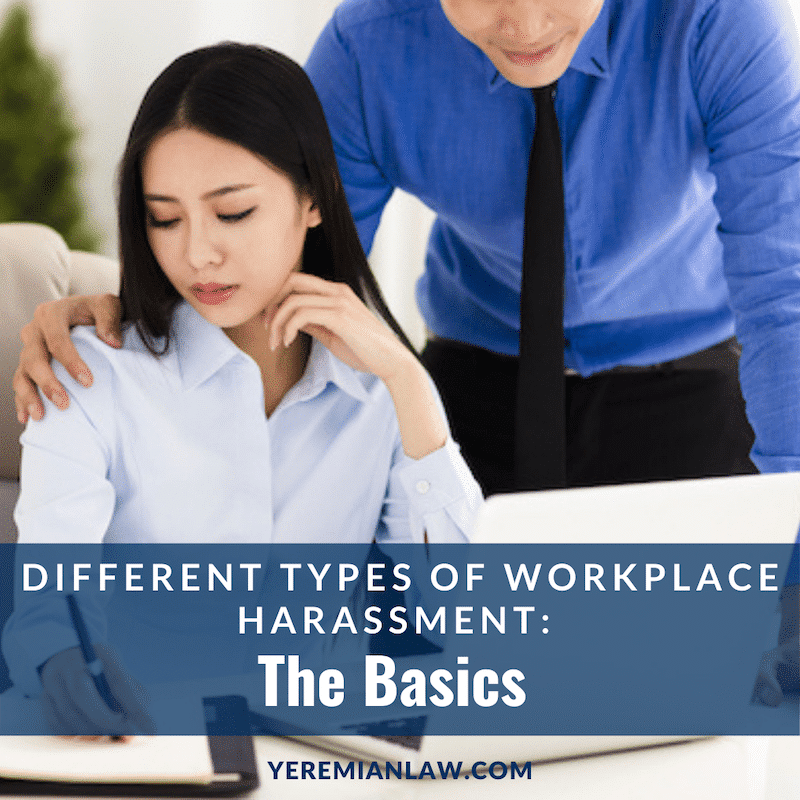Harassment is often illegal in the workplace – and though many people assume sexual harassment is the only type that violates the law, that’s simply not true. Sexual harassment does occur far too often (and it’s the most commonly reported type), but harassment can take many other forms as a violation of the law. This guide explains the different types of workplace harassment.
Different Types of Workplace Harassment: The Basics
Harassment is speech or action that’s severe or pervasive enough to create a hostile or abusive work environment. That means it can be words – such as slurs or jokes – or it can be a type of physical action, such as gestures or unwanted touching. The most common type of workplace harassment is sexual harassment, but it can occur across the following categories, as well:
- Age
- Disability
- National origin
- Race
- Religion
- Sex
- Sexual orientation and marital status
Workplace Harassment Related to Age
Under the Age Discrimination in Employment Act, it’s unlawful for your employer to commit – or to permit – workplace harassment related to age. Employers aren’t allowed to ask age-related questions during interviews or on applications (unless they’re genuinely necessary to hire the right person for the job), and they’re not allowed to harass you about your age if you’re over 40. For example, your boss can’t say, “You’re getting a little old. When are you going to retire and make room for younger folks in here?” or continuously hound you about retiring if it creates a hostile or abusive work environment.
Disability-Related Workplace Harassment
The Americans With Disabilities Act prohibits employers to commit or permit workplace harassment related to disability. Any behavior that creates a hostile or abusive work environment can be considered harassment, such as intentionally placing items out of reach of someone in a wheelchair or mocking someone with different abilities.
National Origin Harassment in the Workplace
National origin harassment is illegal. That means any behavior, including verbal or physical, that singles out a person because of their national origin or affiliation with a particular ethnic group – including people who are married to spouses of a specific national origin or ethnic group – that creates a hostile work environment or an abusive workplace is against the law. This type of behavior may include stereotyping comments, slurs or other actions.
Workplace Harassment Related to Race
Racial harassment is against the law. The most common forms of racial harassment in the workplace involve jokes and slurs – and they don’t have to be directed at anyone in particular for them to count as harassment. Title VII of the Civil Rights Act of 1964 strictly prohibits this type of harassment.
Religious Workplace Harassment
Your employer cannot permit religious harassment in your workplace. Religious harassment can include jokes about your religion, giving you a hard time for requesting holy days or other important days off, or a variety of other actions or comments that turn your work environment into a hostile or abusive one.
Related: 3 facts about racial discrimination in the workplace
Workplace Harassment Related to Sex or Gender
Jokes about women or men not being capable of doing a job, slurs, taunts, name-calling, and stereotypes can all fall into the category of workplace harassment related to sex or gender. So do gender-motivated physical threats or attacks. This type of harassment can occur between people of the same gender or people of different genders, and it can also occur because of someone’s perceived gender.
Related: Does California law protect you against pregnancy discrimination?
The First Thing to Do if You’ve Been Harassed at Work
Tell the person harassing you to stop. If you don’t feel comfortable doing so, tell a supervisor (or your supervisor’s supervisor), or someone in your company’s human resources department. If you don’t receive any resolution, you may need to contact a workplace discrimination and harassment attorney.
Do You Need to Talk to a Lawyer About Workplace Harassment?
If you’ve been harassed at work, we may be able to help you get the justice you deserve. Call us at 818-230-8380 or fill out the form below to schedule your free consultation with an experienced Los Angeles discrimination and harassment attorney.




